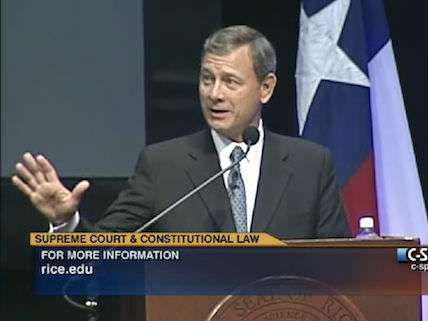Supreme Court Rules for Criminal Defendant Who Posted Violent, Threatening Rap Lyrics to Facebook
Federal conviction overturned in Elonis v. United States
Anthony Elonis claimed that he was "just an aspiring rapper" when he posted a series of violent, profanity-laced writings on Facebook, including accounts of him murdering his estranged wife, murdering his boss and co-workers, and murdering others. "Art is about pushing limits," he wrote at one point. "I'm willing to go to jail for my Constitutional rights."
The federal government took Elonis up on that offer, charging him with five counts of transmitting "in interstate or foreign commerce any communications containing any threat to kidnap any person or any threat to injure the person of another." A federal jury eventually convicted him on four counts and sentenced him to 44 months in prison.

Today the U.S. Supreme Court threw out Elonis' conviction. "The jury was instructed that the Government need prove only that a reasonable person would regard Elonis's communications as threats, and that was error," declared the majority opinion of Chief Justice John Roberts. "Federal criminal liability generally does not turn solely on the results of an act without considering the defendant's mental state."
According to Roberts, "Elonis's conviction…was premised solely on how his posts would be understood by a reasonable person. Such a 'reasonable person' standard is a familiar feature of civil liability in tort law, but is inconsistent with 'the conventional requirement for criminal conduct—awareness of some wrongdoing.'"
Until today's decision, this case also questioned whether or not Elonis' writings should be protected by the First Amendment. In Elonis' view, his Facebook posts were no different than the graphic rap lyrics of artists such as Eminem. According to the federal government, however, Elonis was making "true threats" of violence against others. "The First Amendment does not require that a person be permitted to inflict those harms based on an unreasonable subjective belief that his words do not mean what they say," the government argued.
But because Chief Justice Roberts' limited his judgment to the meaning of the federal criminal statute, "it is not necessary to consider any First Amendment issues."
Writing in dissent, Justice Clarence Thomas faulted his colleagues for improperly voiding Elonis' conviction while failing to provide a clear standard that will help decide similar cases in the future. The Court's judgment, Thomas wrote,
throws everyone from appellate judges to everyday Facebook users into a state of uncertainty. This uncertainty could have been avoided had we simply adhered to the background rule of the common law favoring general intent. Although I am sympathetic to my colleagues' policy concerns about the risks associated with threat prosecutions, the answer to such fears is not to discard our traditional approach to state-of-mind requirements in criminal law. Because the Court of Appeals properly applied the general-intent standard, and because the communications transmitted by Elonis were "true threats" unprotected by the First Amendment, I would affirm the judgment below.
The Supreme Court's opinion in Elonis v. United States is available here.

Show Comments (31)